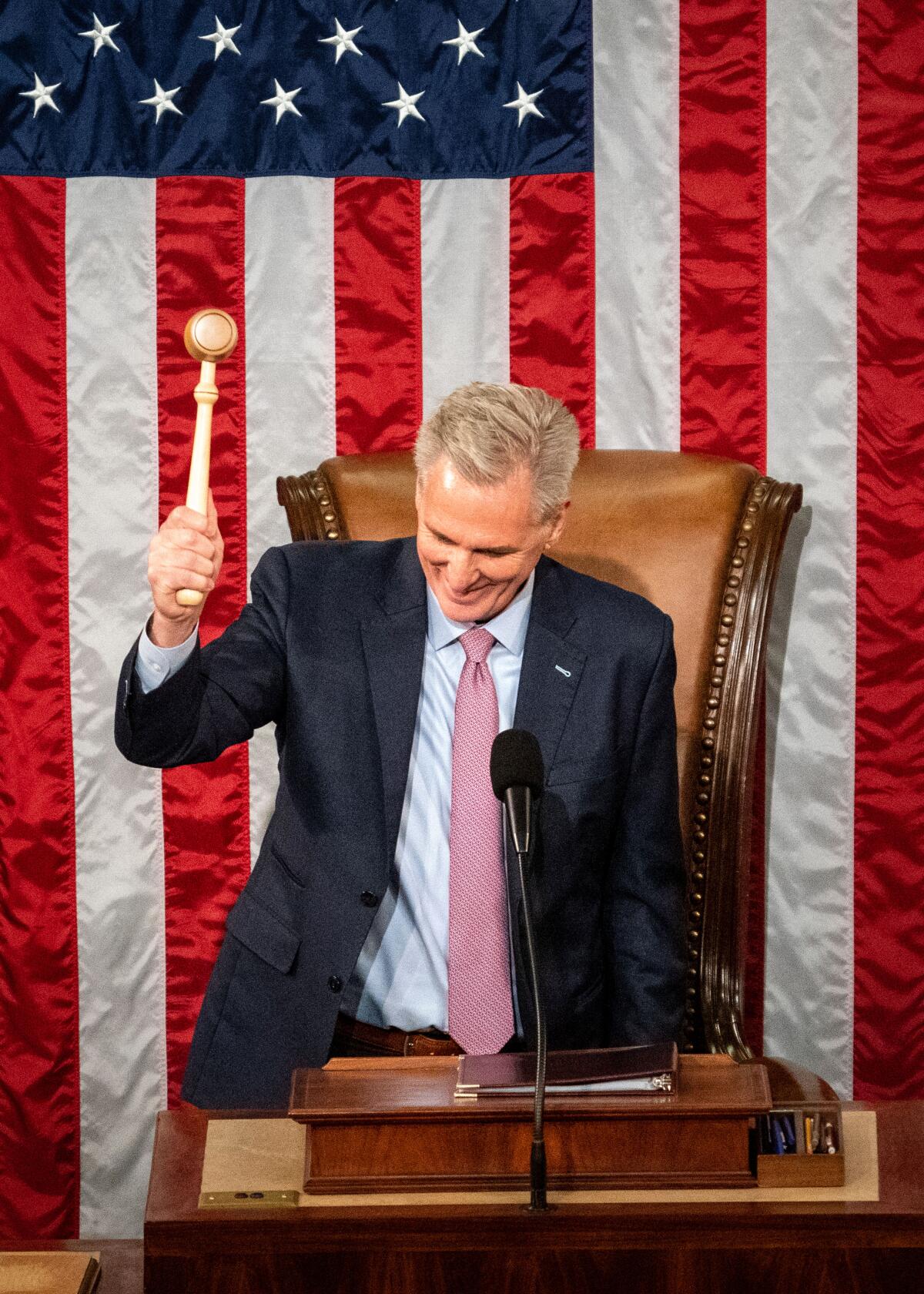Column: Republicans being the party of fiscal conservatism? Don’t believe it for a minute

- Share via
With a Democrat inhabiting the White House, perhaps the most predictable thing about House Republicans’ return to power is this: They’ve rediscovered their faux fiscal conservatism.
All week members of the Republican majority have been chest-beating about how, thanks to the new House rules they devised, they will restore rectitude to federal budgeting. Income will be balanced against spending and debt reduced, just as American families have to do at their kitchen tables.
Don’t take that promise to the bank. It’ll bounce. And not because Republicans are up against the supposedly profligate Democrats who control the White House and Senate. As we begin what’s sure to be a chaotic two years of Republican governance in the House, a little fiscal history is in order, no green eyeshades needed.
In short, Republicans forfeited the title “fiscal conservatives” so long ago, most Americans weren’t even born yet.
Opinion Columnist
Jackie Calmes
Jackie Calmes brings a critical eye to the national political scene. She has decades of experience covering the White House and Congress.
A fiscal conservative advocates for small government and low taxes but is open to higher taxes if necessary to erase deficits. That kind of thinking defined the Republican Party for most of the 20th century.
Starting with the Reagan era, however, the party flipped its orthodoxy on its head: Republicans became so anti-tax that each time their party took power, they willfully drove up deficits in the higher cause of slashing taxes for businesses and the rich. And each time, Republicans’ claims that the tax cuts would pay for themselves (economic growth!) were disproved by the record — Reagan’s, George W. Bush’s and Donald Trump’s.
Yet to hear House Republicans lately, you’d think Democrats and a few RINOs were responsible for the entire $31-trillion gross federal debt. Heck, we’re still paying on debt from Bush’s administration, when, for six of his eight years, Republicans also controlled Congress. Republicans’ red ink, which quickly washed away a budget surplus Bush had inherited, flowed largely from tax cuts, an unnecessary war in Iraq and a big, unfunded domestic program, Medicare Part D, to cover seniors’ prescription drugs.
Democrats for years had wanted to add a drug benefit for older Americans, but were stymied by the cost; in 1990, they’d agreed with the first President Bush (a fiscal conservative, mostly) that new tax cuts or spending on entitlement programs like Medicare would be paid for with separate spending cuts or tax increases. The second Bush and his Republican allies simply got rid of the rule, so they could cut taxes and enact Part D, deficits be damned. (As Vice President Dick Cheney famously said, deficits didn’t matter anymore.)
Democrats, in true fiscally conservative fashion, revived the “pay as you go” rule when they regained power in Congress. President Obama’s Affordable Care Act was mostly paid for with spending cuts and new taxes on businesses that stood to benefit from additional paying patients. When Trump was elected and Republicans took charge again, those taxes were repealed, adding some Obamacare debt to the nation’s tab and once again rendering Republican claims to fiscal rectitude hollow.
That move was responsible for just a fraction of the debt we’re now shouldering from Trump’s tenure. Lest the former president’s defenders rush to argue that he was blindsided by a costly pandemic, know this: Before COVID-19 struck, Trump and a Republican-controlled Congress had piled up nearly $5 trillion in debt, projected over a decade, from both higher spending and tax cuts. That’s according to the (truly) fiscally conservative Committee for a Responsible Federal Budget.
Trump left behind almost $8 trillion in total debt after four years, more than either the second Bush or Obama did in each man’s eight years as president, as the conservative Manhattan Institute found.
Did the purported deficit-hawk Republicans now running the House complain? Of course not. On that, like any other outrage of the Trump years, they were silent. And complicit.
But they’ve found their voices now that Joe Biden is president, although their tough talk goes only so far: Tax cuts don’t have to be paid for under the new Republican rules, which require that only of some new spending.
Three times during Trump’s term, Republicans quietly went along in raising the federal debt limit, so that the government could keep borrowing to cover costs that they, along with past presidents and Congresses, had run up on the nation’s credit card. No drama, no conditions. Yet even before House Republicans won power in the midterm elections, they were promising to hold the debt limit hostage unless Biden and Democrats would agree to huge spending cuts.
“We’re not just going to keep lifting your credit card limit, right?” then-minority leader and now Speaker Kevin McCarthy said in October.
“Your” credit card, says the man who’s been a member of Congress for 16 years, and in the House Republican leadership for 14. Over time, he voted for countless unfunded tax cuts and more spending than he’d admit to.
Raising the debt limit doesn’t add a cent to deficits and debt; it merely ensures that the government can pay existing bills. But refusing to raise it could be catastrophic, for the nation and for a global economy that relies on the United States for a stable dollar. When House Republicans seriously flirted with blocking a debt ceiling increase in 2011, under Obama, the threat rocked markets.
To play this game again would be the most fiscally irresponsible and least fiscally conservative thing that Republicans could do. But as history warns us, don’t put it past them. They’re fiscal fakers.
More to Read
Get the latest from Jackie Calmes
Commentary on politics and more from award-winning opinion columnist.
You may occasionally receive promotional content from the Los Angeles Times.












